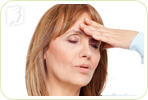Most are familiar with the throbbing pain of a headache. Headaches can range in severity, from mildly distracting pain to debilitating migraines that come accompanied by nausea, blind spots, and vomiting. It's common for all varieties of headaches to occur during menopause due to the hormonal imbalances that arise during these years. Changes in estrogen and progesterone cause blood vessels in the brain to expand, constrict, and - when this inhibits nerve pathways - cause headaches . Headaches during menopause can be treated and prevented by using natural techniques and making small lifestyle adjustments.
Drink Herbal Tea
Estrogen and progesterone imbalances can cause hormone headaches, which is why women often experience headaches and migraines during menopause. Imbalanced levels of these hormones can cause the blood vessels to expand and constrict sporadically, which causes throbbing pain in the head, known as a tension headache. Black cohosh tea could regulate estrogen-deficiency headaches over time, as the herb has an estrogenic function that helps restore lost hormones. It is also an anti-inflammatory, pain-relieving herb.
Dong quai, fennel, and red clover are all herbs with estrogenic activity. Drinking infusions of these could play a part in reducing the occurrence and intensity of headaches over time.
Exercise
Aerobic exercise is an effective way of combating headaches because it alleviates stress-related headache symptoms, such as muscle tension and anxiety. Exercising for 30 minutes a day at a fairly high intensity (e.g., running, swimming, or cycling), five days a week can significantly reduce the occurrence and intensity of headaches on a short and long-term basis.
Drink Water
Headaches can be triggered or exacerbated by dehydration. The recommended liquid consumption for women is 1.6 liters per day, which equates to around eight 200 mL glasses. Though any beverage can count toward this amount, water is a healthy source of hydration, as it does not contain calories or fat.
Cut Dietary Triggers
Consuming any of the following can cause headaches to occur: the compound monosodium glutamate (MSG), found in many junk foods and Chinese foods; nitrates, found in hot dogs and cured meats; and tyramine, found in smoked fish and soy products. Excessive caffeine intake or the sudden withdrawal of caffeine may also cause activity in the brain's blood vessels and resultant headaches.
Avoid Environmental Triggers
Loud, brightly lit environments can trigger the onset of headaches, as can high altitudes. The body is also sensitive to changes in air pressure and certain weathers, and high humidity, storms, or rising temperatures can cause electrical and chemical changes in the brain that may invoke or exacerbate a headache.
Breathe
Concentrate on your breathing; it is harder to feel stressed or focus on pain when you are breathing deeply. Inhale for eight counts, hold for four counts, and exhale for eight counts until you feel calmer and the pain begins to subside.
While headaches during menopause are common, they are also usually treatable with these natural and effective methods. If you notice headaches increasing in intensity or if the pain becomes life-affecting, however, it is worth consulting a doctor about your headaches to rule out any other underlying medical condition and discuss treatment options.
Sources
- Better Health Channel.(2014).Headaches and Hormones. Retrieved June 11, 2014, from http://www.betterhealth.vic.gov.au/bhcv2/bhcarticles.nsf/pages/Headache_and_hormones
- National Health Service UK.(2013).Headaches. Retrieved June 11, 2014, from http://www.nhs.uk/conditions/Headache/Pages/Introduction.aspx
- National Health Service UK.(2013).Hormone headaches. Retrieved June 11, 2014, from http://www.nhs.uk/Livewell/headaches/Pages/Hormonalheadaches.aspx
- Office on Women's Health.(2012). Migraine fact sheet. Retrieved June 11, 2014, from http://www.womenshealth.gov/publications/our-publications/fact-sheet/migraine.html




